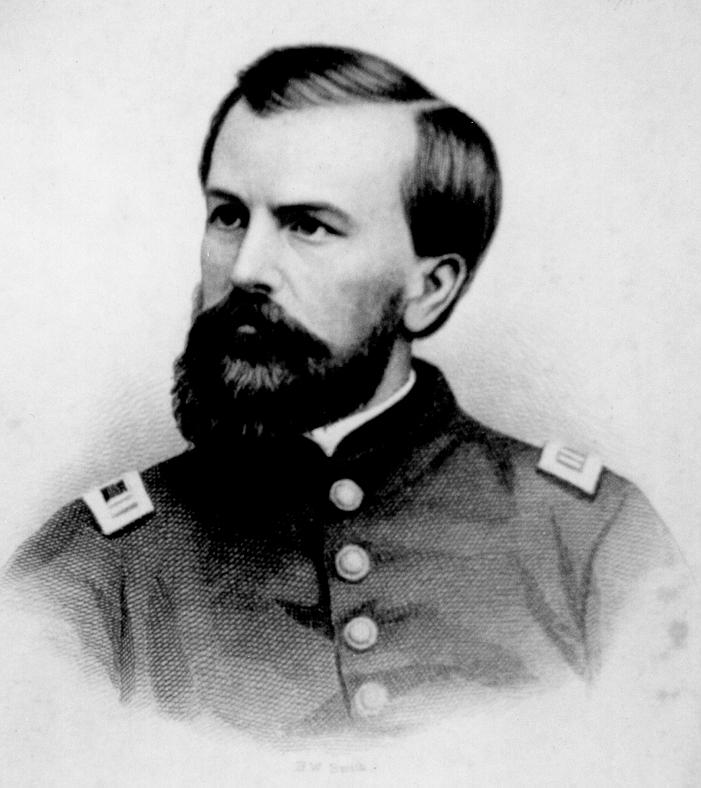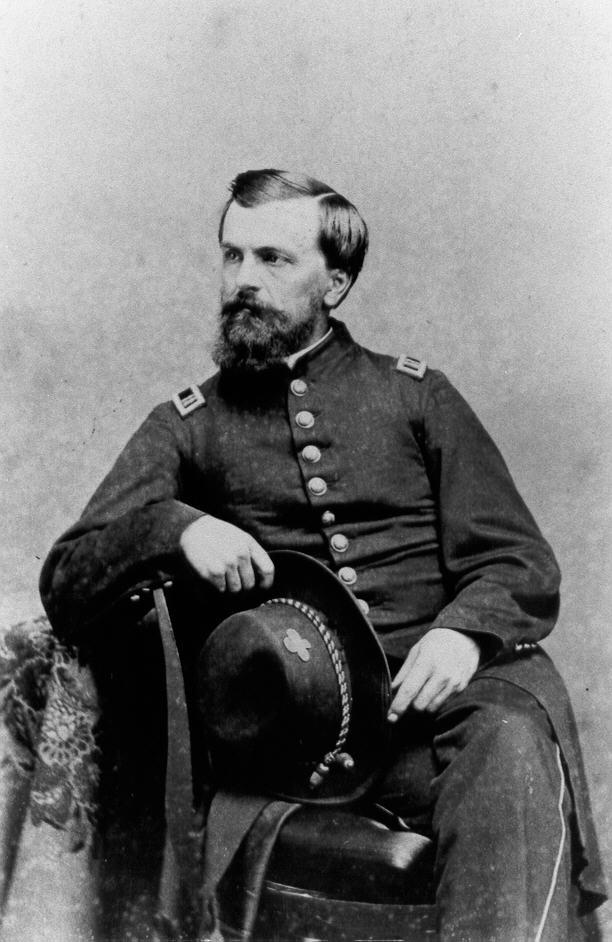|
Captain SAMUEL FISKE |
||
|
Captain SAMUEL FISKE. Born in Shelburne, Mass., July 23d, 1828, and dying at Fredericksburg, Va., May 23d, 1864, Samuel Fiske lived a life so full of valuable lessons and so replete with stirring action, that it is simply impossible to begin to do him justice in the brief limits assigned to each of our fallen comrades. Hence I can but give the dry dates of the events thereof. A bright, lively, restless, loving and beloved lad, he entered Amherst College in 1844. The youngest and smallest of his class, he at once sprang to its head as a scholar. He graduated in 1848, with the second honor—the Salutatory—his Professors saying that he only lost the first honor by the necessity which compelled him to labor outside during the whole course to earn the wherewithal to pay for his education. In his Sophomore year he became interested in religion, and made a public profession of his faith. After graduation he taught two years, and then became a Tutor at Amherst for three years. During this time he was licensed to preach. In 1855 he resigned his tutorship, and spent a year in Europe and the East. He traveled in company with a party of educated professors, and chronicled the journey in the Springfield Republican, under the non de plume of “Dunn Browne,” which he ever afterward retained. These letters were afterward published in book form, as were later those that he wrote to the same newspaper during the war—and delightful volumes are they both. Soon after his return from Europe he was called and settled over the Congregational church at Madison, Conn. His ministry was marked by the same originality and independence of action that always characterized him, and his people were at first surprised at his ready wit and humor, but soon found out that beneath it all lay a willingness for earnest work, and a desire for their greatest real good, with a true consecration to his work. In a seven years’ pastorate he won the affection of his people, so that when the earnest patriot resolved that his duty to his country in peril was even higher than that to his people at such a time, it wrung their hearts to part with him. Enlisting as a private in Company I of the 14th, the Company in organizing elected him 2d Lieutenant, and he was commissioned as such, August 19th, 1862. He passed safely through Antietam, bearing the baptism of fire with perfect calmness. He rose from a sick bed to take part in the battle of Fredericksburg, but was prevented from reaching it in time. Dec. 20, 1862, he was commissioned 1st Lieutenant, and January 19, 1863, Captain of Co. G, from his own town of Madison. At the battle of Chancellorsville he was captured while serving on Gen. Carroll’s Staff, and taken to Libby Prison. He was released in time to take part at Gettysburg, where he did gallant service in his Staff position. He was in all the battles of the corps in 1863, and returning to the line of his Regiment that fall, had the pleasure of a visit from his family in his winter-quarters—procuring a leave to escort them home to Madison. Returning to the Regiment he declined the Chaplaincy, preferring to share all the possible perils to come to his own townsmen in their immediate company. He foresaw the probable bloodshed of the opening campaign of 1864, and his last act ere crossing the Rapidan, was to partake of the Communion service with his fellow disciples. A sadness unusual to him marked his demeanor in the march, and in the first great struggle in the Wilderness he was mortally wounded while standing in the very fore front of the fray. Suffering severely in the removal, he was taken to the hospital at Fredericksburg, where all that could be was done. His family were summoned and were with him to the end, which came at last, May 23d, 1864. The whole story of that last fortnight of his life is as impressive a sermon as I ever read. His cheerful disposition, genial humor, earnest patriotism, and religious enthusiasm, all continued to the very last, and leads us to fully understand how Gen. Carroll, tearfully bewailing him, could say that if all Christians were like him, few could resist the claims of religion. The body was taken to Madison by a committee of his parishioners. Here a funeral sermon was preached by Rev. Win. T. Eustis, of New Haven. Thence the remains were removed to Shelburne Falls, his native place, where on the Sunday eve one week from his death they were buried. Professor W. S. Tyler, of Amherst, preached a sermon tender with personal grief. Many memorials have been published, and his own books perpetuate his memory. That our loss was great we know, for I think I say that in which our comrades will all agree, when I say, that among all our dead officers and men, not one was more missed or mourned than the self-made student, the Christian clergyman, and fearless soldier, Samuel Fiske. ”There gleams a coronet of light around our hero’s brow, But of far purer radiance than monarch can bestow; He takes his place among his peers. His peers! And who are they? Princes of yon celestial spheres, whom angel-hosts obey. The heralds have made search, and found his lineage of the best, He stands among the sons of God, a son of God confessed.”
|
||

